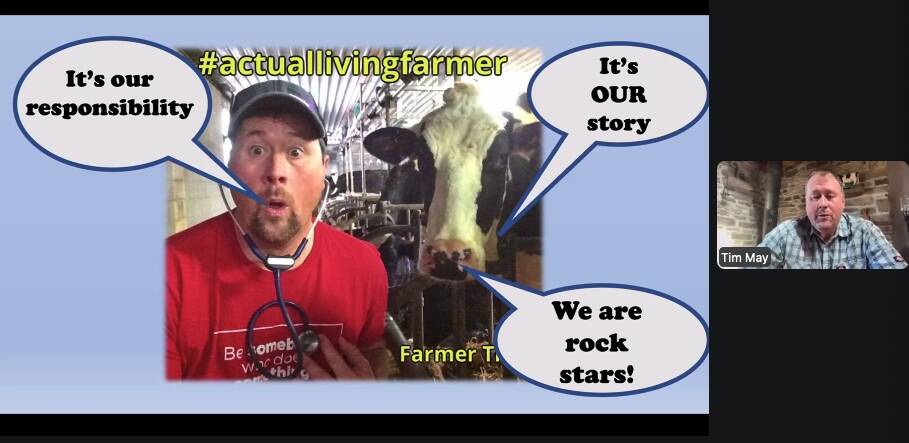Promise to consult abandoned
Regarding the Jan. 24 article “Supreme Court hammers another nail into wheat board’s coffin,” I think for the most part farmers will acknowledge the court’s decision, not to hear the appeal case, and continue on with their normal, everyday lives and challenges.
But every once in a while they will be jolted by a distinct, wafting, unpleasant odour that emanates from the office of Canada’s agriculture minister. This will be a reminder of Minister Ritz, and his abandonment of a promise to consult with farmers and respect a vote for those who support single-desk selling.
Read Also

Sharing stories to promote Canadian farm safety
Personal stories can sometimes go farther than facts and data to promote safe practices on Canadian farms, Canadian Agricultural Safety Association conference attendees hear.
Consulting of farmers ended up as insulting of farmers. Yes, the single-desk selling has been terminated, but the officious manner in how it was accomplished will be remembered for a long time, maybe even to the next federal election.
John Fefchak
Virden, Man.
Suzuki brought an important message to agriculture
I was also at the David Suzuki speech in Brandon in early December. Your editorial was such a different take on what I heard, that it makes me wonder if we were at the same speech.
Do farmers really feel threatened by environmentalists like Suzuki? It’s pretty sad that they don’t feel threatened by the high rate of cancer and neurological diseases that disproportionately affect them as a population. Read the stats on retired farmers who have MS or “farmers’ lung.”
If farmers don’t realize that some of their practices are harmful to the earth and the environment then they are truly out of touch with reality. Why do potato growers continue to use extremely toxic chemicals on their crops? They’ll tell you they have to, to make a profit as a business.
Well, that ties in rather nicely with what Suzuki said: “We have elevated the economy above the very things that keep us alive.” Ask someone what the soil tests reveal about the level of contamination of chemicals after the land has been used to raise potatoes. But, when I read your article, it seems we are not allowed to be concerned about that.
I also find the political “lines” you draw a little strange. If the conservation projects like protecting the waterways is political then, do they ask how the landowner voted in the last election before they help people, or enforce regulations? My own opinion is that people (in general) don’t like change, they don’t like being told what’s good for them, they like to do what’s convenient and easy, and some people will value their own opinion over anybody else’s.
I’ve dealt with lots of farmers over the years. It’s hard when you are up against the attitude of, “I see no reason to change, I’ve always done things like this, that’s the way my dad did things… etc.”
I disagree with your evaluation of Suzuki blowing the chance to connect to people. If all he did that day was make a few people question the “elevation of the economy” then he did lots.
I’m proud he’s Canadian and we need more people like him, instead of like Stephen Harper.
Sherry Wurtz
Brandon, Man.
Off the fence now
Now that I have seen it twice, I must comment on the CWB’s “fence” ad. I know one doesn’t normally comment on ads in Letters to the Editor, but this can’t be ignored.
The first time I saw the “fence” ad, I thought it was an aberration. Perhaps someone packing up old files in the CWB offices found it and published it on a lark as an example of outdated advertising from the ’50s.
Not so. There it was again in last week’s farm papers. It must be a “for real” ad. Over the years, I had remained pretty much on the fence about the CWB with a slight lean in its favour.
Now I am firmly off the fence, and it is not on the side of the CWB. When my daughter showed an interest in doing a diploma in agriculture, I told her, confidently, that things are different now than when I did my degree nearly 40 years ago. Obviously, I was wrong. To paraphrase a 1960’s ad campaign: We sure haven’t come a long way, baby. I think the CWB owes the agricultural community an apology.
Dawn Harris
Niverville, Man.
Let’s make it about science
I’m just wondering if Brian Pallister has done his research. In your Jan. 24 story “Pallister calls for caution on cosmetic pesticide ban,” the premier-in-waiting is quoted as saying, “If there’s danger with a pesticide, it isn’t allowed.”
Has he also been reading those mandatory pesticide labels issued by Health Canada? Has he noticed that the warnings are not being taken seriously? Like Mr. Pallister I’m “always concerned when I see an unscientific approach taken.”
For example, Manitoba Conservation continues to issue licences for the spraying of picloram/Tordon in public rights-of-way (also known as drainage ditches) even though these products have been scientifically linked to amphibian and fish death and to reproductive malfunction in small mammals.
Am I reading too much into his comments to assume, then, that the present corporate favoured, unscientific approach to pesticide use will come to an end with a change of government?
Really, this discussion over pesticide use doesn’t involve science. We don’t have enough testing personnel and equipment in the field to make this about science. We’re not even asking the scientists we do have on this case the right questions. Most pesticides are used in combinations with other pesticides and synergistic carriers. We’re only testing in labs for single ingredients. We understand completely that mixing our drinks at a party isn’t a good idea, but have no idea what mixing sprays does in our environment.
Let’s quit using any pesticide that has not been proven, as it’s used in the field and by a consensus of independent scientists, to be safe in our public spaces. Or, if we don’t have the science to make that judgment, let’s err on the side of caution. Both (Conservation and Water Stewardship) Minister Mackintosh and Mr. Pallister talk about caution. The first one to take environmental science and health seriously gets my admiration.
David M. Neufeld
Turtle Mountain
Supreme Court rulings concerning
The recent decision by the Supreme Court, dismissing the farmers’ application to have their case heard, leaves many questions unanswered. Contrary to Agriculture Minister Gerry Ritz’s statements, the case was not about “the right of western Canadian grain farmers to make their own business decisions.” Rather, it was about whether or not the government has to follow the laws of the land.
This case was asking about several things, but firstly does the government have to follow the law when a judge rules against it? Previously, governments abided by the court’s rulings and did not proceed with pushing through legislation, but instead they filed an appeal if they thought the rulings were wrong. This current government not only carried through with the legislation contrary to the ruling, but also appealed the ruling at the same time; a total disregard to the court’s decision.
This case was also about farmers having the right to vote on the type of marketing structure they wanted, irrespective of the government’s ideology, since this right was enshrined in legislation.
Finally, this case was about the minister of agriculture’s integrity. Before the federal election, he stated he was not prepared to move arbitrarily and that farmers believe in democracy and so did he. After the election, that promise disappeared; a great bait-and-switch tactic.
With the Supreme Court dismissal of the farmers’ case, more questions are left unanswered. Canadians are left with the impression that this government does not have to follow the law.
Rob Cowan
Swan River, Man.
Private science and public good not always the same
Should the column by Laura Rance “Biotech or bioknowledge,” trigger euphoria or a more profound cynicism? Should we say, “Oh well, if Mark Lynas is now on the side of biotechnology, that ends my resistance to it?”
In this old farmer, it only triggers a deeper level of cynicism. And it’s not aimed at biotechnology so much as those who control the process.
Mark Lynas achieved a level of notoriety by tearing up crops. But that activity smacks too much of Luddism to have a long shelf life. So how to get back into the limelight? Well, death-bed conversions are always good for a bit of attention, and if you can have a death-bed conversion and not die…
Whatever the long-term effect of genetic engineering, it has certainly had an effect in the short term. Corn, soybean and canola yields have, without question, increased. But at what cost?
Neo-liberal governments have, from the Reagan-Thatcher-Mulroney period, increasingly farmed out research and development to the private corporations, with predictable results.
Driven by the need for ever-increasing profits, these corporations have by means of patents, privatized to themselves things that have always been in the public domain.
Intellectual property rights have trumped real property rights without exception. Farmers have become little more than captive customers, paying what they are asked and taking what they are given.
Does anyone seriously believe that if science suggests a certain path of research that is better for farmers, consumers and the world in general and another path offers the corporations far greater profits — that they will hesitate for even one second to follow the more profitable path?
Science in the hands of people driven almost solely by the profit motive, sheltered by intellectual property rights, empowered by fawning governments is a very malleable product.
Only very gullible people believe that science trumps profit.
John Beckham
Winnipeg, Man.
CWB changes transfer profits away from farmers
Regarding the story in the Jan. 24 issue “Supreme Court hammers another nail in wheat board’s coffin,” Agriculture Minister Gerry Ritz states the changes to the CWB were about giving farmers the right to market their own grain.
What a misleading statement. He has given the multinational grain companies the free hand selling over 65 per cent of the wheat and barley to the end-users all over the world. All that profit is now going to the grain companies, taken out of farmers’ pockets. The question is: After politics will Ritz be sitting as a director of a multinational grain company?
David Bailey
Saskatoon, Sask.
Letters
















